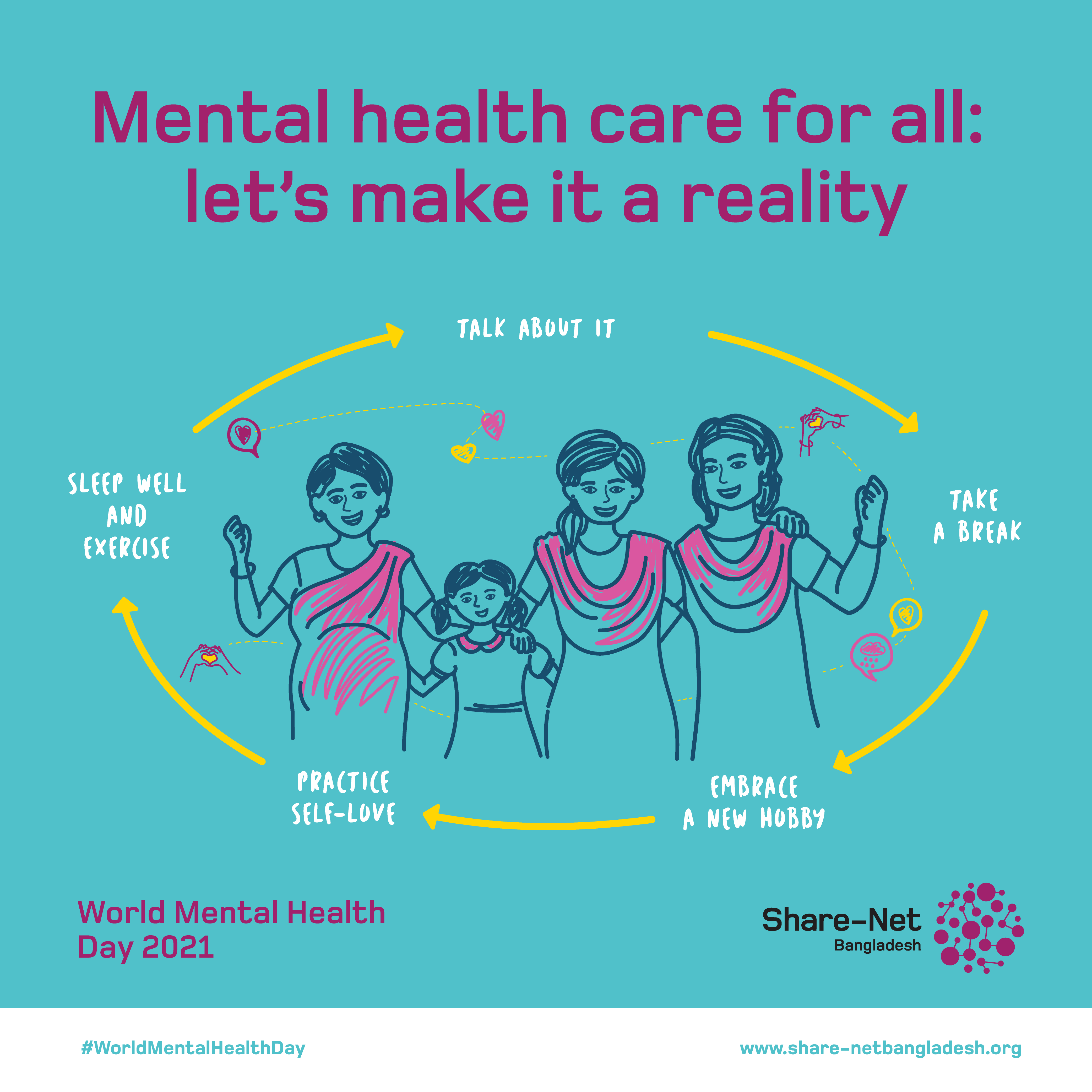Looking into Mental Health and SRH: World Mental Health Day 2021
A good mental health is highly essential to achieve full potentials in our day-to-day life and lead a fulfilling life for ourselves. Today on 10th October 2021, World Mental Health Day 2021, the slogan is ‘Mental health care for all: Let’s make it a reality’. As sexual and reproductive health is an strongly interdependent to one’s mental health throughout their life, Share-Net Bangladesh observes the day with significance.
To put some light on SRH and mental health, a study authored by Amit Timilsina from Nepal published on 2018 titled ‘Intersecting Mental Health and Sexual and Reproductive Health’ cited a lot of factors of SRH that impacts one’s mental health at different phases of their life.
About 10-15% of women in developed countries and 20-40 % of women in developing countries experience depression during pregnancy or after childbirth (WHO/UNFPA, 2009). Research have shown people with serious mental illness tend to have more lifetime sexual partners, limited use of contraception and unplanned pregnancy among women which leads to greater risk of Sexually Transmitted Infections (STIs) including Human Immune Deficiency Virus (HIV) and Acquired Immune Deficiency Syndrome (AIDS) (Dickerson FB, Brown CH, Kreyenbuhl J, et al (2004).
Furthermore, violence is estimated to occur in between 4% and 8% of pregnancies and physical abuse in pregnancy is reported to cause higher stress (Petersen R et al., 1997). Significantly higher levels of depressive symptoms have been found among women seeking treatment for infertility than in presumed fertile controls (Beaurepaire J et al., 1994). A study in past has shown high prevalence of depressive disorder and higher frequency of psychiatric diagnosis during miscarriage and prevalence of depressive and anxiety disorder among women during menopausal transition (Elena Toffol, 2013).
During the puberty phase, young people go through lots of physical, mental and psycho-social changes (Brooks-Gunn, J., & Warren, M. P., 1989) and are susceptible to ranging degrees of mental stress. The mental strain is even higher especially for those who are questioning their own sexuality and gender identity (Russell, Stephen T., and Jessica N. Fish., 2016). These physical changes when accompanied with deleterious cultures and traditions can create conducive environment for poor mental and physical health. Menstruation in Bangladesh is still a topic of stigma and discrimination. Isolation from family, social exclusion, low self esteem, fear of sexual abuse and assault leads to mental stress and results into trauma and depression (Amgain B., 2012).
Gynecological conditions affect womens’ physical and mental health and wellbeing. Perinatal depression is one of the most prevalent and severe complications of pregnancy and childbirth. Many such mental health issues induced during pregnancy or post child birth hampers not only mental, physical and social wellbeing of mother but also child care and overall development of child.
Infertility is yet another reproductive issue incurring Mental Health issue. Guilt, fear of earlier sexual experience and use of contraceptives, substance abuse, and misdeed of past life is prominent among men and women with infertility and this triggers sadness, mental stress, anxiety and depression in person (Mahlstedt PP, 1985). Likewise, during post reproductive cycle, menopause labeled as reproductive problems also contributes to fluctuation of emotions and leads to mental tension and anxiety among women (Avis NE et al., 1994).
People with mental illness in many cases can therefore cause a toll on their physical health and make them prone to many other diseases due to the increased stress, anxiety depression. Thus, it is crucial for us to put our mental health as a priority. Check out the infographic on ‘Daily ways to improve your mental health’ by Engage for Success via this link: https://engageforsuccess.org/wellbeing/infographic-daily-ways-improve-mental-health/
References:



